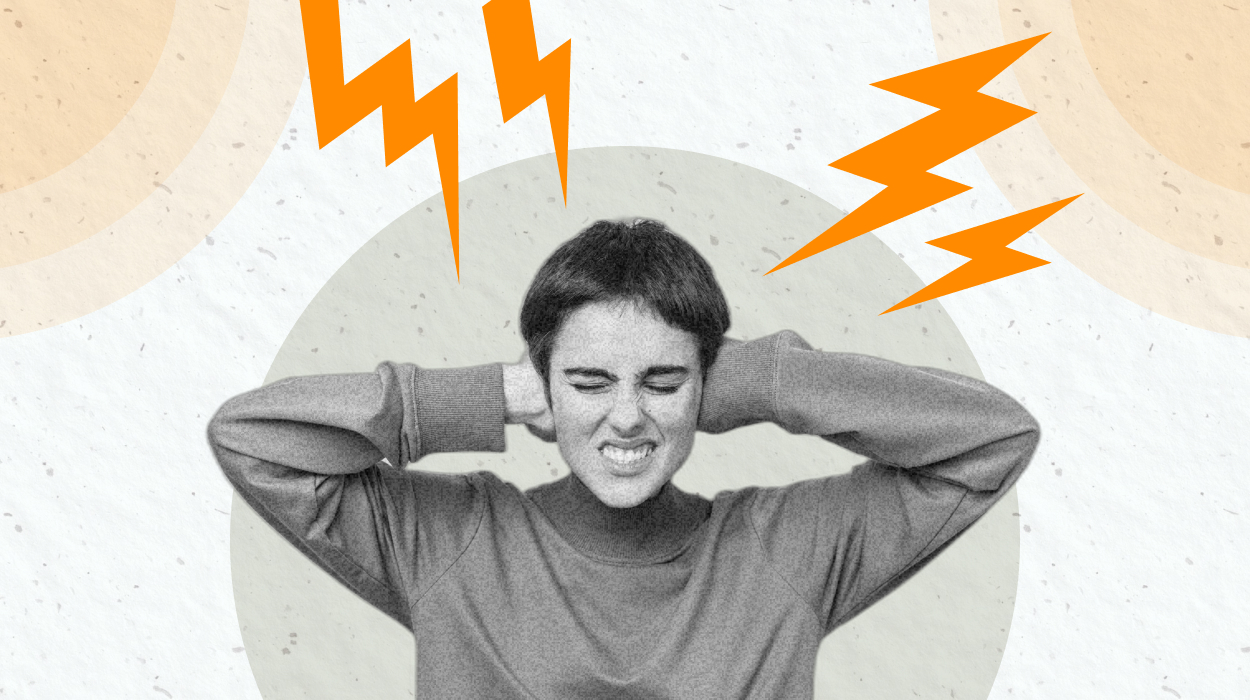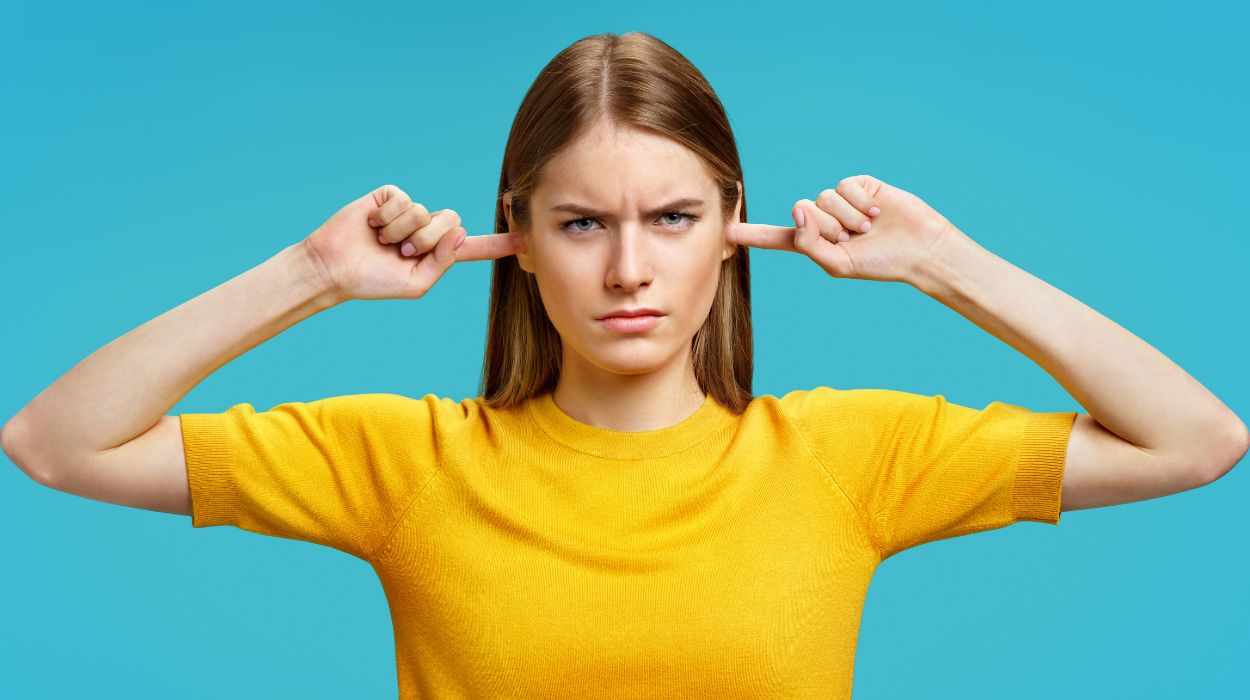 Evidence Based
Evidence Based
Evidence Based
This article is objectively based on relevant scientific literature, written by experienced medical writers, and fact-checked by a team of degreed medical experts.
Our team of registered dietitian nutritionists and licensed medical professionals seek to remain objective and unbiased while preserving the integrity of any scientific debate.
The articles contain evidence-based references from approved scientific sites. The numbers* in parentheses (*1,2,3) will take you to clickable links to our reputable sources.
5 Simple Tips For Coping With Noise Sensitivity Anxiety In 2024

In the hustle and bustle of modern life, noise is ever-present. From the constant hum of city traffic to the cacophony of a crowded shopping mall, these everyday noises can sometimes feel overwhelming[1], especially for individuals experiencing noise sensitivity anxiety[2].
This condition is more than just a mere dislike for loud sounds. Noise sensitivity anxiety presents a where certain noises can trigger intense distress, leading to heightened sensitivity and causing significant disruption in daily life. Whether it’s the sudden roar of a motorcycle, the repetitive tick of a clock, or even the subtle background noise of a busy cafe, these sounds can prompt severe anxiety attacks in people with this condition.
Let’s dive into the world of noise sensitivity anxiety and explore effective strategies on how to cope with it.
Why Do Loud Noises Give Me Anxiety?
- Loud noises can trigger the body’s stress response, causing feelings of anxiety.
- Those with noise sensitivity anxiety have a heightened response to certain sounds.
- Anxiety can be caused by anticipatory fear of specific noise triggers.
- Past traumas or negative experiences with certain sounds can lead to anxiety.
- An overactive autonomic nervous system may play a role in heightened sound sensitivity.
What Is Noise Sensitivity Anxiety?

Noise sensitivity anxiety, also known as hyperacusis, is a heightened reaction to everyday sounds – specifically, sounds that most people can easily ignore. It’s more than a simple annoyance or discomfort caused by loud noises. It’s an extreme sensitivity to specific sounds[3], leading to anxiety and distress that interferes with daily life.
This condition can be a symptom of anxiety disorders, often co-existing with other mental health conditions. While some individuals may feel anxious about a specific sound, others may have a broader range of triggering sounds that provoke their anxiety.
People with noise sensitivity anxiety can perceive certain noises as excessively loud, distressing, or painful. For example, the sound of a ringing phone or a barking dog might be tolerable for most but can cause significant distress in those with this condition.
Noise sensitivity anxiety can be challenging to manage without professional help. A better understanding of its causes, symptoms, and treatments can offer hope and direction to those affected.
Symptoms Of Noise Sensitivity Anxiety
Noise sensitivity anxiety is not just about feeling disturbed by loud noises but also involves a wide range of physical and emotional symptoms. Understanding these symptoms can help identify the condition and indicate the need for professional support.
Physical Symptoms
- Anxiety at night: Many people with noise sensitivity anxiety report increased distress at night due[4] to heightened awareness of sounds. This can interfere with sleep patterns and lead to insomnia.
- Ear discomfort or pain: Certain sounds can cause a painful sensation in the ears, often described as a sharp or stabbing pain.
- Nausea or dizziness: Extreme sensitivity to specific sounds can result in physical symptoms like nausea, dizziness, or even balance issues.
Emotional Symptoms
- Fear or distress: Not just encountering specific noise triggers, but even the anticipation of distressing noises can lead to significant emotional distress and fear. This anticipatory anxiety can further exacerbate the condition.
- Irritability and mood changes: Regular exposure to triggering sounds can lead to persistent irritability, mood swings, and decreased patience or tolerance.
- Avoidance behaviors: People with noise sensitivity anxiety may avoid social events, public places, or situations where they expect to encounter their specific sound triggers, leading to social isolation and interfering with daily life.
Remember, these symptoms can vary greatly from person to person, and if you’re experiencing them, it’s crucial to seek help from a medical professional.
Causes Of Noise Sensitivity Anxiety
The exact cause of noise sensitivity[5] anxiety can be hard to pinpoint as it varies from person to person. However, several factors can contribute to the onset of this condition:
Neurological Factors:
- Autonomic Nervous System: A hyperactive autonomic nervous system can heighten the body’s response to certain stimuli, including noise.
- Limbic System: The limbic system, responsible for emotions, might play a role in noise sensitivity anxiety, associating certain sounds with fear or distress.
Psychological Factors:
- Past Traumas: Individuals who have experienced traumatic events, especially those related to loud noises, may develop a heightened sensitivity to sound.
- Anxiety Disorders: Noise sensitivity anxiety can often be a symptom of an anxiety disorder. The heightened state of worry and fear typical of these disorders can worsen sensitivity to noises.
Physical Health:
- Hearing Conditions: Issues with the ear or hearing can sometimes lead to noise sensitivity.
- Other Health Conditions: Certain health conditions, including migraines, fibromyalgia, PTSD[6], and post-concussion syndrome, have been linked with increased sensitivity to sound.
Understanding the potential causes of noise sensitivity anxiety can help in devising effective treatment plans and management strategies.
Noise Sensitivity Anxiety Treatment
Treating noise sensitivity anxiety[7] requires a multifaceted approach that addresses the condition’s physical, emotional, and environmental aspects. Here are several methods used to help manage and alleviate noise sensitivity anxiety:
Therapy: Cognitive Behavioral Techniques
Cognitive-behavioral therapy (CBT) is often the first line of treatment for anxiety disorders and other anxious symptoms such as noise sensitivity anxiety. CBT helps individuals understand their thought patterns, identify triggers, and develop coping mechanisms. Specific techniques used in CBT for noise sensitivity anxiety might include exposure therapy, where patients are gradually exposed to distressing sounds in a controlled environment to reduce their anxiety over time.
Medication
While no specific medication for noise sensitivity anxiety exists, certain drugs used for anxiety disorders can help manage the symptoms. These can include selective serotonin reuptake inhibitors (SSRIs), benzodiazepines, or beta-blockers. It’s crucial to consult a medical professional before starting any medication.
Mindfulness And Meditation
Mindfulness and meditation can be effective in managing noise sensitivity anxiety by promoting relaxation and helping individuals stay present in the moment rather than anticipating future distressing noises. Techniques might involve deep breathing exercises and guided visualization.
Lifestyle Changes
Maintaining a healthy lifestyle can also contribute to managing noise sensitivity anxiety. Regular exercise, for instance, has been shown to reduce stress levels and improve overall mental health. Similarly, a balanced diet can help maintain overall well-being and resilience.
Using Supplements
Some people find relief from their noise sensitivity anxiety through the use of certain supplements. The best anxiety supplements, such as Magnesium or Valerian Root, are known for their calming effects. There has also been increasing interest in the potential benefits of cannabidiol (CBD) products. Be sure to check out CBDfx reviews for more information about their efficacy.
How To Deal With Noise Sensitivity Anxiety

Living with noise sensitivity anxiety can be challenging, but there are practical strategies you can implement to manage the condition and improve your quality of life. Here are some key approaches:
Practical Strategies For Noise Reduction At Home And Work
One of the first steps to dealing with noise sensitivity anxiety is to identify and minimize exposure to specific noise triggers in your daily life. This could involve using soft earplugs, creating quiet spaces in your home, or adjusting your workspace to reduce background noise.
Utilizing Technology: Noise-Canceling Devices And Apps
Technology can be a useful ally in managing noise sensitivity. For example, noise-canceling headphones can help to minimize or completely shut out disturbing sounds in noisy environments. Moreover, various smartphone apps are designed to create white noise or soothing sounds that can help mask distressing noises.
Building A Support Network: Friends, Family, And Support Groups
Having a solid support network can be invaluable when living with noise sensitivity anxiety. Friends and family members who understand your situation can offer empathy and assistance. Moreover, joining a support group (either in-person or online) can provide a sense of community and shared understanding.
Personal Empowerment: Self-Care And Coping Mechanisms
Managing noise sensitivity anxiety also requires a personal commitment to self-care. This includes prioritizing sleep and learning how to sleep better, especially if your anxiety at night is high. Regular exercise, a balanced diet, and relaxation techniques, such as breathing exercises for anxiety, can also help.
Lifestyle Adaptations: Regular Exercise And Healthy Eating
Adopting a lifestyle that supports your well-being can help reduce the symptoms of noise sensitivity anxiety. Regular physical activity helps reduce stress, while a balanced diet supports overall health.
Implementing these strategies can go a long way in helping you manage your noise sensitivity anxiety. However, it’s essential to remember that each person is unique, and what works for one might not work for another. Always consult with a healthcare professional for personalized advice.
Conclusion
Noise sensitivity anxiety can be a challenging condition to live with, but understanding its symptoms, causes, and treatments can be a significant step toward management. Practical strategies and lifestyle changes, support networks, and appropriate professional treatment are all part of a comprehensive approach to managing noise sensitivity anxiety. Remember, everyone’s experience with this condition is unique, and it’s crucial to seek professional help to tailor your treatment plan. With the right knowledge and resources, you can navigate this journey and lead a healthier, more comfortable life.
Frequently Asked Questions
Yes, anxiety disorders can increase your sensitivity to noise. Heightened awareness is part of the body’s response to perceived danger or stress.
Treatment includes a combination of cognitive-behavioral therapy, lifestyle changes, and, in some cases, medication. Support from friends, family, and support groups is also beneficial.
Sudden sensitivity to noise can be triggered by several factors, including stress, trauma, or a medical condition. Consult a medical professional for an accurate diagnosis.
You may be experiencing noise sensitivity anxiety, a condition where specific sounds or loud noises cause significant distress and anxiety. You may also be exposed to too many loud, distressing sounds that would disturb the average person.
While there’s no one-size-fits-all cure, management strategies include therapy, lifestyle adjustments, technological aids, and seeking professional help.
Anxiety can heighten your senses, making you more susceptible to loud noises or specific sounds.
In medical parlance, it is often called hyperacusis. Noise anxiety falls under the umbrella of anxiety disorders and is often associated with conditions such as generalized anxiety disorder, panic disorder, and specific phobias.
Certain noises can act as triggers if they’re associated with a past traumatic event or if you have heightened sensitivity due to an anxiety disorder.
+ 7 sources
Health Canal avoids using tertiary references. We have strict sourcing guidelines and rely on peer-reviewed studies, academic researches from medical associations and institutions. To ensure the accuracy of articles in Health Canal, you can read more about the editorial process here
- Gong, X., Fenech, B.A., Blackmore, C., Chen, Y., Rodgers, G., Gulliver, J.S. and Hansell, A. (2022). Association between Noise Annoyance and Mental Health Outcomes: A Systematic Review and Meta-Analysis. [online] 19(5), pp.2696–2696. doi:https://doi.org/10.3390/ijerph19052696.
- Baguley, D.M. and Hoare, D.J. (2018). Hyperacusis: major research questions. [online] 66(5), pp.358–363. doi:https://doi.org/10.1007/s00106-017-0464-3.
- Coey, J.G. and Orlando De Jesus (2023). Hyperacusis. [online] Nih.gov. Available at: https://www.ncbi.nlm.nih.gov/books/NBK557713/
- Frei, P., Mohler, E. and Röösli, M. (2014). Effect of nocturnal road traffic noise exposure and annoyance on objective and subjective sleep quality. [online] 217(2-3), pp.188–195. doi:https://doi.org/10.1016/j.ijheh.2013.04.003.
- Welch, D., Dirks, K.N., Shepherd, D. and Ong, J. (2022). What is Noise Sensitivity? [online] 24(114), pp.158–165. doi:https://doi.org/10.4103/nah.nah_56_21.
- Jayaditya Devpal Patil, Manar Abdulkarim Alrashid, Ayah Eltabbakh and Fredericks, S. (2023). The association between stress, emotional states, and tinnitus: a mini-review. [online] 15. doi:https://doi.org/10.3389/fnagi.2023.1131979.
- Fackrell, K., Iskra Potgieter, Giriraj Singh Shekhawat, Baguley, D.M., Sereda, M. and Hoare, D.J. (2017). Clinical Interventions for Hyperacusis in Adults: A Scoping Review to Assess the Current Position and Determine Priorities for Research. [online] 2017, pp.1–22. doi:https://doi.org/10.1155/2017/2723715.



